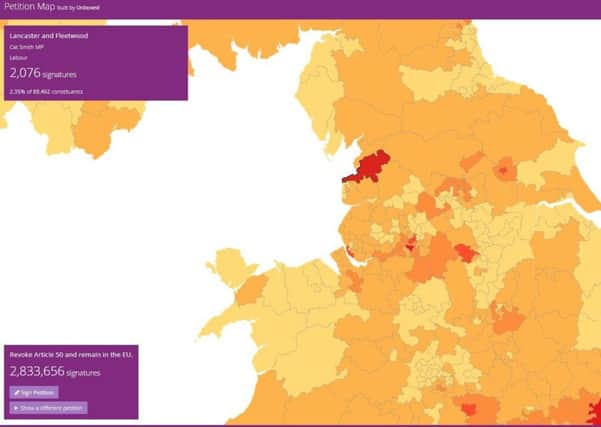Thousands in Lancaster and Morecambe sign ‘revoke Article 50’ petition


The petition, which has garnered nearly three million signatures so far, crashed the government’s website several times on Wednesday due to the volume of traffic it created.
A “petition map”, pinpoints where in the country the petition has been signed.
Advertisement
Hide AdAdvertisement
Hide AdAccording to the data from Unboxed Consulting at 3pm on March 22, 4,865 people in the Lancaster and Fleetwood constituency have signed the petition, with 2,987 from Morecambe and Lunesdale adding their name.
In Westmorland and Lonsdale, 2,009 people have signed the petition.
Both the Lancaster and Fleetwood and Morecambe and Lunesdale constituencies voted to leave the EU in the referendum in 2016.
A petition calling on the government to leave the EU in March 2019 without a deal attracted 392,966 signatures.
Advertisement
Hide AdAdvertisement
Hide AdThe government debated the petition and said: “The deal that we have reached with the EU is the right one for the United Kingdom. Leaving without a deal would risk uncertainty for the economy, for business and for citizens.”
Parliament considers all petitions that get more than 100,000 signatures for a debate.
The petition calling for the revocation of Article 50 states: “The government repeatedly claims exiting the EU is ‘the will of the people’. We need to put a stop to this claim by proving the strength of public support now, for remaining in the EU. A People’s Vote may not happen - so vote now.”
When asked for the prime minister’s view on the petition, a No 10 spokeswoman told The Guardian newspaper: “The prime minister has long been clear that failing to deliver on the referendum result would be a failure of our democracy and something she couldn’t countenance.”
Advertisement
Hide AdAdvertisement
Hide AdOn Thursday night, after eight hours of talks, EU leaders offered to delay Brexit until May 22 if MPs approve Mrs May’s deal next week.
If they do not approve it, the delay will be shorter - until 12 April - at which point the UK must set out its next steps or leave without a deal.